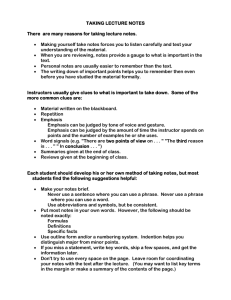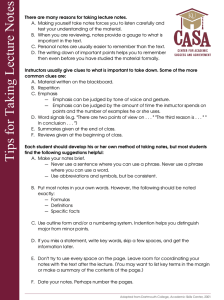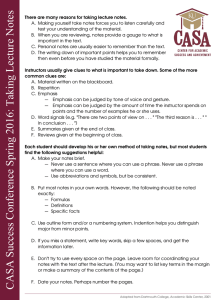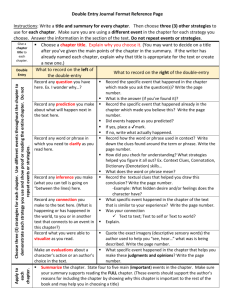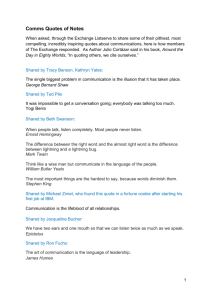TAKING LECTURE NOTES
advertisement
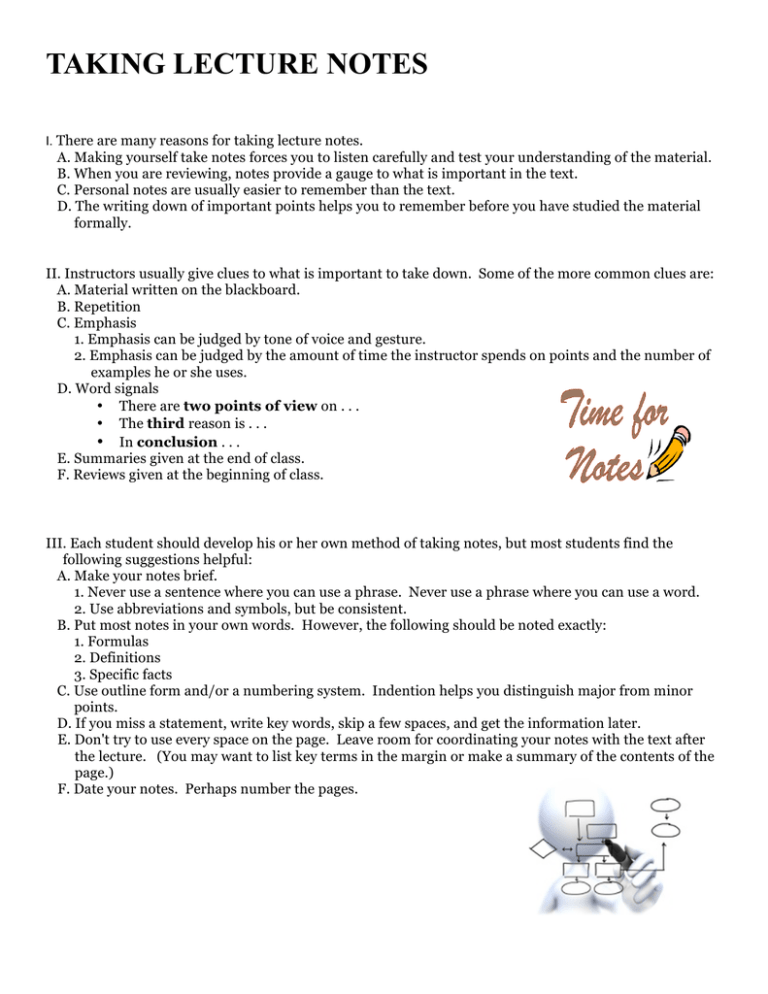
TAKING LECTURE NOTES I. There are many reasons for taking lecture notes. A. Making yourself take notes forces you to listen carefully and test your understanding of the material. B. When you are reviewing, notes provide a gauge to what is important in the text. C. Personal notes are usually easier to remember than the text. D. The writing down of important points helps you to remember before you have studied the material formally. II. Instructors usually give clues to what is important to take down. Some of the more common clues are: A. Material written on the blackboard. B. Repetition C. Emphasis 1. Emphasis can be judged by tone of voice and gesture. 2. Emphasis can be judged by the amount of time the instructor spends on points and the number of examples he or she uses. D. Word signals • There are two points of view on . . . • The third reason is . . . • In conclusion . . . E. Summaries given at the end of class. F. Reviews given at the beginning of class. III. Each student should develop his or her own method of taking notes, but most students find the following suggestions helpful: A. Make your notes brief. 1. Never use a sentence where you can use a phrase. Never use a phrase where you can use a word. 2. Use abbreviations and symbols, but be consistent. B. Put most notes in your own words. However, the following should be noted exactly: 1. Formulas 2. Definitions 3. Specific facts C. Use outline form and/or a numbering system. Indention helps you distinguish major from minor points. D. If you miss a statement, write key words, skip a few spaces, and get the information later. E. Don't try to use every space on the page. Leave room for coordinating your notes with the text after the lecture. (You may want to list key terms in the margin or make a summary of the contents of the page.) F. Date your notes. Perhaps number the pages. NOTE MAKING Learning to make notes effectively will help improve your study and work habits and to remember important information. Often, students are deceived into thinking that because they understand everything that is said in class they will therefore remember it. This is dead wrong! Write it down. As you make notes, you will develop skill in selecting important material and in discarding unimportant material. The secret to developing this skill is practice. Check your results constantly. Strive to improve. Notes enable you to retain important facts and data and to develop an accurate means of arranging necessary information. Here are some hints on note making. 1. Don't write down everything that you read or hear. Be alert and attentive to the main points. Concentrate on the "meat" of the subject and forget the trimmings. 2. Notes should consist of key words or very short sentences. If a speaker gets sidetracked it is often possible to go back and add further information. 3. Take accurate notes. You should usually use your own words, but try not to change the meaning. If you quote directly from an author, quote correctly. 4. Think a minute about your material before you start making notes. Don't take notes just to be taking notes! Take notes that will be of real value to you when you look over them at a later date. 5. Have a uniform system of punctuation and abbreviation that will make sense to you. Use a skeleton outline and show importance by indenting. Leave lots of white space for later additions. 6. Omit descriptions and full explanations. Keep your notes short and to the point. Condense your material so you can grasp it rapidly. 7. Don't worry about missing a point. 8. Don't keep notes on oddly shaped pieces of paper. Keep notes in order and in one place. 9. Shortly after making your notes, go back and rework (not redo) your notes by adding extra points and spelling out unclear items. Remember, we forget rapidly. Budget time for this vital step just as you do for the class itself. 10. Review your notes regularly. This is the only way to achieve lasting memory. ©Academic Skills Center, Dartmouth College 2001
